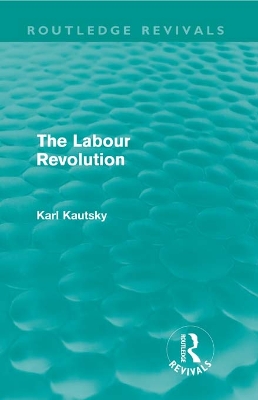Routledge Revivals
5 total works
First published in 1925, Karl Kautsky presents a Marxist history of Christianity and Christian society. Divided into four key sections, the book begins by considering the personality of Jesus as portrayed within Pagan and Christian sources and highlighting the Church’s difficulty in presenting a unified and concurrent image of Jesus and interpretation of His words. Next, Kautsky analyses the structure of Roman society, with particular emphasis on the slave-holding system, the Roman State and the historiography of the period. In the third section, an early history of the Jewish people is presented, whilst the final section discusses the beginnings of Christianity and the social struggles present within early Christian society. This is a fascinating reissue, which will be of particular interest to students of Church History, Christian theology and the various interpretations of Jesus.
Bolshevism at a Deadlock was written Karl Kautsky, one of the leading Marxist intellectuals of the late-nineteenth and early-twentieth centuries, in response to the catastrophic failures of Stalin's first Five Year Plan, which was intended to raise Russian industry and productivity to equal that of Western Europe. Kautsky sets out to demonstrate how the repressive autocracy of the Bolsheviks and the disregard for economic exigencies achieved nothing more than "the wholesale pauperisation and degradation of the Russian people", and prophesies the imminent collapse of Soviet Russia in the face of mass famine, ideological dogmatism and, ultimately, the failures inherent in the 1917 Revolution itself.
Kautsky's analysis of the situation of Socialist Russia at the beginning of the troubled 1930s will be of interest to students of pre-war Soviet political practice, economic history and domestic policy.
First published in English in 1920, this work is a reissue of Karl Kautsky's seminal work dealing with the origins and history of the forces at work in revolutionary epochs, which offers pathbreaking insights on the development of civilisation.
The opening chapters, dealing with eigthteenth century France, are of special interest to the student of the French revolution. The section devoted to the Commune of Paris offers a stimulating and provocative description of this famous govenment of the working class.
The reissue of this controversial and extraordinary work will be welcomed by all those interested in the history of Communism in particular and the theory and history of revolution in general.
First published in English in 1924 this ambitious work, by the famous Marxist theoretician Karl Kautsky, aims to provide nothing less than an "exposition of the methods to introduce socialism" amongst the capitalist economies of Europe in the post-World War One era. Looking back on the experiences of the German socialist movement and looking forwards to the likelihood of a Labour government in Great Britain, he discusses the problems facing a labour revolution in Europe, with particular reference to the role of the middle classes, the transitional period between capitalism and socialism, and the economic impact of a socialist revolution.




